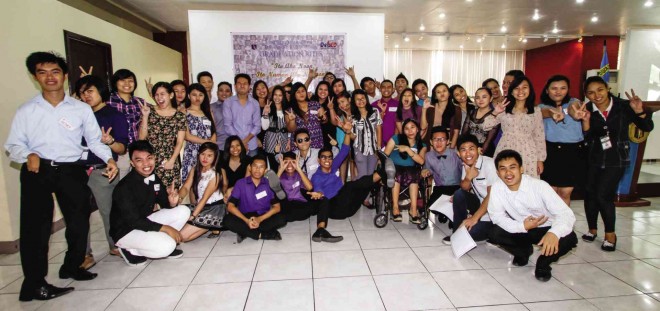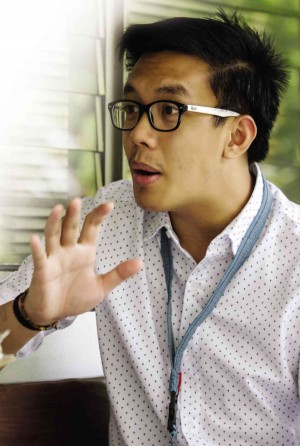An up close and personal look at DepEd, with pay

SPES participants learned about government service during the few weeks they worked at the DepEd. LEO M. SABANGAN II.
They thought they were in it just for the money. But for the 100 college students who recently completed the Special Program for the Employment of Students (SPES) of the Department of Education (DepEd), the summer job became an introduction to how a government agency functioned.
Through SPES, one of the eight components of Kabataan 2000 Program, they got a closer look at a government entity that churned out the education projects they used to take for granted.
A youth work initiative that started during the administration of President Fidel V. Ramos, the program helps poor but deserving students stay in school by employing them at local government offices and national agencies during summer and Christmas vacations so that they can make enough money for their tuition and other school needs.
SPES has always meant menial work—photocopying documents, making coffee, running errands. Not this year though.
This time, Education Secretary Armin Luistro proposed that SPES participants could and should do more, including being involved in DepEd projects, according to Raphael Magno, DepEd executive assistant and SPES head.
“Some of them were tasked to review instructional materials for K to 12 after undergoing some training,” Magno said. The working students were asked if a learning material was good enough or needed improvement.
Eighteen-year-old John Enzo Oira, who was assigned to the instructional materials office, was surprised that the DepEd asked them to work on textbooks.
“At first, I was nervous because it was important material … that children will actually use,” Oira said. After a month of laying out and proofreading textbooks, he said he would not look at any book the same way again.
“We read the books and then submitted them to officers, who sent them to others in either the basic education or the secondary education bureau. The materials were sent back for us to reread … The process got repeated more or less 10 times,” Oira said.
Learning value of books
At home, it became his habit to remind his four younger siblings, who are all in school, to take care of their books and read them even outside the school.
“I will definitely wait for the books we worked on to be distributed,” he said with pride in his eyes.
SPES trainees were conditioned to work with “a sense of urgency,” debunking the misconception that the government moved at a snail’s pace.
“We showed them that it is not supposed to be like that. In the government, things have to get done quickly,” Magno said.
The trainees responded by excitedly getting things done, which kept the workplace in high spirits, energizing even the older government employees, Magno said. “SPES has really created a positive experience not just for the students but for the government as well.”
Under SPES, participants are entitled to the daily minimum wage, P466 in Metro Manila, of which 60 percent comes from the host agency. The remaining 40 percent is supposed to be paid by the Department of Labor and Employment (DOLE).
The DepEd gives trainees its share of their salaries every week, about P1,600.
But no date has been set for the release of DOLE’s share. Magno said the DepEd was pushing for the money to be given to the students before the end of each month.
A lifeline
More than a thousand pesos a week is a lot of money to students whose college education is always at risk of being cut short at any time.
Henry Lumanta II, 22, is the son of a taxi driver who earns about P200 to P300 daily. His mother died last year. Although his two siblings do not live with them, he and his father still barely have enough for a day.
Lumanta is an incoming college senior at a computer school in Fairview, Quezon City. He did not think he would get this far if not for SPES.
“I have been doing SPES for the past four summers. It’s the only way I can help my father pay for our basic needs and save up for my tuition every year,” he said.
Before he found out about SPES, Lumanta had looked elsewhere for work. Companies turned him down, sometimes after just one look at him. Having suffered from encephalitis or the swelling up of the brain when he was a baby, Lumanta walks with a limp. His right arm is permanently bent at the elbow.
He does not mind how he looks. What he lacks in posture, he makes up for in smarts. He has been a consistent honor student and made it to the dean’s list in college.
“But the companies I apply to do not bother to check my excellent school records,” he said. “They said they would call but no one ever did.”
Magno said the DepEd made sure that differently abled people like Lumanta had an equal chance in landing a spot on the SPES list.
“Everybody should have a fair chance,” he said. “We employ persons with disabilities and even out-of-school youth who want to study again.”
SPES is open to students or out-of-school youth who are at least 18 years old and whose family annual net income does not exceed P143,000. A copy of their grades from the last semester or the last school year they attended has to be submitted.
The DepEd’s SPES team does not simply choose the neediest or the smartest. Magno said participants had to undergo a rigorous process. The SPES staff chose from more than 400 applications this year. One-on-one interviews were conducted. After more deliberations, a hundred were chosen.
This year, the SPES team laid out a weekly, structured capacity-building session for participants conducted by younger government employees.
“First, the workshop was about the ‘self’ to give the students the opportunity to discover and assess how well they knew themselves,” Magno said.
Then it moved on to the concept of kapwa at pakikipag-kapwa, he said. Finally, the sessions sought to translate self-awareness and appreciation of others into love of country.
The value-added training turned SPES into more than just an employment scheme. The monetary reward ceased to be the be-all and end-all of the program for students.
For Paul John Tuprio, 20, an electronics student at Rizal Technological Institute who worked for a month in the DepEd’s planning division, the program was an eye-opener.
“I now realize that it is not that easy for the government to address everything I was complaining about when I was in high school—lack of books and chairs, the meager pay of public school teachers,” Tuprio said. “It takes a lot of serious work.”
Magno said opening the doors of the government to young people showed them how bureaucracy worked. By getting them involved in serving the larger population, he said, “we could be developing a pool of young leaders who would be inspired to work for the government in the future.”















